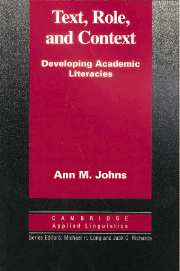Book contents
- Frontmatter
- Contents
- Series editors' preface
- Preface
- Acknowledgments
- 1 Literacy and pedagogy: Three views
- 2 Genre knowledge and socioliteracies: What readers and writers may share
- 3 Genre and social forces: “Homely” and academic texts
- 4 Discourse communities and communities of practice: Membership, conflict, and diversity
- 5 Special roles: Literacy practitioners as campus mediators and researchers
- 6 Students as researchers: Investigating texts, processes, and contexts
- 7 The socioliterate classroom: Basic tenets and goals
- 8 Putting tenets and goals into practice: Using portfolios in literacy classrooms
- 9 Conclusion
- References
- Index
9 - Conclusion
Published online by Cambridge University Press: 05 October 2012
- Frontmatter
- Contents
- Series editors' preface
- Preface
- Acknowledgments
- 1 Literacy and pedagogy: Three views
- 2 Genre knowledge and socioliteracies: What readers and writers may share
- 3 Genre and social forces: “Homely” and academic texts
- 4 Discourse communities and communities of practice: Membership, conflict, and diversity
- 5 Special roles: Literacy practitioners as campus mediators and researchers
- 6 Students as researchers: Investigating texts, processes, and contexts
- 7 The socioliterate classroom: Basic tenets and goals
- 8 Putting tenets and goals into practice: Using portfolios in literacy classrooms
- 9 Conclusion
- References
- Index
Summary
In an important article entitled “University in the Digital Age,” Brown and Duguid (1995) ask why students and their parents sacrifice so much time, money, and energy for a postsecondary education, why this experience is so important to so many people throughout the world. For students who plan to be an full-time academics, to teach in universities or conduct research, the answer may be fairly straightforward: “Universities provide access to communities of scholars and testimony for a student's experience among these communities” (1995, p. 4). However, many of the students enrolled in our literacy classes and our universities do not aspire to be fully initiated members of disciplinary communities or to devote their lives to academic study. Instead, they have chosen to go into business, computer technology, engineering, and other professions. For them, or perhaps for all students, the answer to this question is complex and revealing.
Parents and students often say that a university education is a “downpayment on a career” (Brown & Duguid, 1995, p. 6). They tell us that their degrees are “professional union cards,” or that they have been assured by their secondary school teachers and counselors that with advanced degrees, they will be able to make “at least twice the salary of the average secondary school graduate.” Others, including some university faculty, view education as a kind of “knowledge delivery service” (Brown &C Duguid, 1995, p. 7).
- Type
- Chapter
- Information
- Text, Role and ContextDeveloping Academic Literacies, pp. 151 - 154Publisher: Cambridge University PressPrint publication year: 1997

